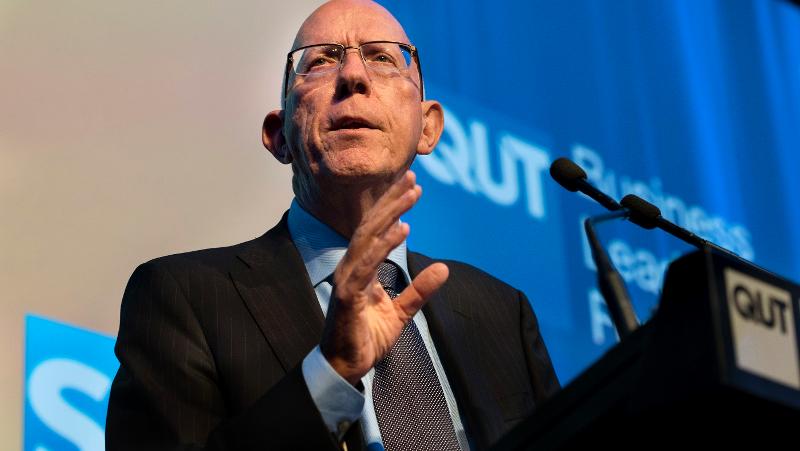
Rapidly changing technology and the rise of artificial intelligence mean many of today's business models will be “under pressure if not disappear”, former Aurizon CEO and Managing Director Lance Hockridge told the QUT Business Leaders’ Forum.
Mr Hockridge, who led the rail giant for six-and-a-half years until December 2016, told the audience at the Hilton Brisbane that while "we all talk about the speed of change" we are guilty of underestimating it and the threat it places on familiar business models.
“Technology in my view is going to change and take us into new directions far more quickly than we anticipate," he said.
"Then add to that the rise of artificial intelligence, and I believe that we will see a situation where very many of our business models, some of which have been around for decades and longer, will be under pressure – indeed, if not disappear.”
Mr Hockridge said while this disruption presents challenges, it will also help more clearly define the attributes of successful leadership “as being about being able to understand the broad operational, technological and geopolitical context and focus the business you lead to succeed through having the culture that affords the kind of service your customers want”.
Mr Hockridge said during his time with Aurizon and its privatisation, there were significant areas of change and success but “there were a lot of things we tried to do that, for whatever reason, simply didn’t proceed or did not succeed”.
Aurizon last month reported a $188 million loss for the 2017 financial year, down from a profit the year before and the first annual loss since the former Queensland Rail business became a listed company in 2010. It also announced it would be selling its underperforming intermodal freight business.
Mr Hockridge said his focus was always on growing long-term, sustainable value for owners of the business as well as improving the culture of the organisation.
He believes while strong foundations such as world-leading operational, financial and engineering capability, information technology and hardware underpin corporate performance and sustainability, an organisation’s culture is equally important and its “critical and distinguishing capability”.
“Organisations are continuing to focus on foundation skills, as they should, but at the expense of underplaying some of the most critical skills, such as fostering employee creativity and innovation,” he said
“Recent surveys show the majority of leaders are not satisfied with their own organisation’s development offerings, and many of them believe that their own leadership is not improving in its capability.”
Mr Hockridge said fundamental to culture of an organisation are its values. At Aurizon, core values on which he focused were safety and workplace diversity.
“The organisation had an unacceptable [safety] record, and that was largely built around not having the right kind of belief system that all injuries could be prevented,” he said.
“Over time we transformed that to the point that in the two years before I retired there were no lost time injuries in that business.”
At the time of privatisation, he said, barely 10% of Aurizon’s workforce was female, while “indigenous representation was well below benchmark levels and LGBTIQ was probably somebody’s computer password for all its relevance to the organisation”.
Mr Hockridge set a target to have 30% female representation in the Aurizon workforce by the end of this decade; when he left last year the number of women had grown to 18% – but he conceded there was still a way to go.
His firm belief is that organisations with diversity have “better culture and better business outcomes”.
“Diversity is not an issue in my view which will take care of itself over time,” he said. “Why would we believe that is the case when so many of the CEOs, C-suite executives and indeed employees today in our country are male.
“The males in our business environment have all the power. We are the ones who have to drive change.
“In my view it is essential that we as CEOs and business leader demonstrate not just understanding but courage to step into uncomfortable territory in order to effect change.”
Reflecting on the past 40 years of his career, Mr Hockridge said it had been “quite a wild ride” for the “son of a Tenterfield carpenter” and while he had “changed gears” he hoped he had many years to go in business leadership.
The final QUT Business Leaders’ Forum for the year will be with Mirvac CEO and Managing Director Susan Lloyd-Hurwitz on October 25.
Media contact:
Karen Milliner, QUT Media, 07 3138 1841 or k.milliner@qut.edu.au
After hours, Rose Trapnell, 0407 585 901 or media@qut.edu.au




